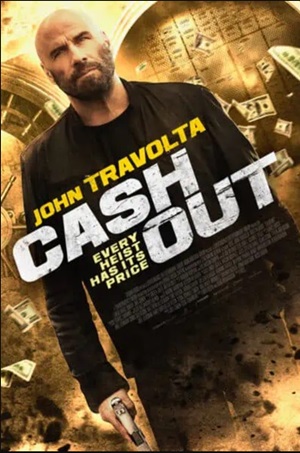
Only Thing the Forgettable Heist Thriller Cash Out Steals is an Audience’s Time
Mason Goddard (John Travolta) is an elite international thief leading a talented, close-knit crew of professionals who has called it quits. The group’s last theft went sideways after they were infiltrated by the intelligent and beautiful Amelia Decker (Kristin Davis), a committed FBI agent who accidentally fell in love with her intended prey. While Mason and his team managed to make their escape, the whole affair soured him on pulling any future heists, and now he’s content to live out his remaining years in peaceful retirement nursing a cold beer.
If only his younger brother Shawn (Lukas Haas) did the same. He’s convinced the crew made up of tech impresario Link (Natali Yura), getaway driver Anton (Quavo), and kindhearted muscle Hector (Noel Gugliemi) to pull a quick in-and-out bank robbery. But there’s nothing simple about this job, and soon the entire team — including Mason, who only showed up to try and stop the crime before it began — is trapped inside the bank with 23 hostages. And who is the FBI negotiator assigned the task of convincing them to surrender? Amelia Decker.
Cash Out is a paint-by-numbers action-thriller that even with a few intriguing ideas is sadly so anemically paced and rudimentarily plotted it runs out of steam before it has the chance to pick up even a modicum of speed. The opening set piece showcasing Amelia’s betrayal and Mason’s heartbreak is agonizingly forgettable, while the supposedly twisted sleight-of-hand climax has all the emotional oomph of an impromptu mid-afternoon yawn.
What’s most annoying is that there are some solid, if not exactly original, ideas lurking at the center of Dipo Oseni and Doug Richardson’s serviceable screenplay. The safe deposit box Shawn wants to steal belongs to a powerful political and corporate heavyweight, but instead of wads of untraceable cash (or, in this case, millions in cryptocurrency) it actually contains dangerous intel that, if revealed, could prove disastrous for multiple governments. Needless to say, Mason and his team aren’t nearly as worried about Amelia and the FBI as they are the shadowy powerful forces who will stop at nothing, including killing every living soul inside the bank, to keep them from accessing these secrets.
Travolta is no stranger to plots like this, what with larger-than-life villainous turns in major studio behemoths like Broken Arrow, Swordfish, and the 2009 Taking of Pelham 123 remake. But while I initially liked that he’s more grounded and subdued in this, Mason is forced to think on his feet as he assesses the problem and quickly comes up with a plan to get his crew — and the hostages — out of the bank alive, at a certain point it felt like the two-time Academy Award-nominated actor was just going through the motions and picking up an easy paycheck. Travolta still has charisma to burn, and a few scenes do have a certain pizazz, but frustratingly there’s not much to see here, and that’s too bad.
It does not help that he has zero chemistry with Davis, and other than a lovely phone conversation between the Sex and the City actor and a scene-stealing Yura (who is honestly much better than this mediocre trifle deserves), I quickly got the sensation she spent the entire shoot wishing she were somewhere else. This is an aggressively unpleasant performance, one that only gets increasingly tiresome as the film laborious trudges to its conclusion. (Apparently, a sequel has already been shot, and considering Davis has been replaced by Gine Gershon, I’m guessing I’m not the only one who unfortunately felt this way about her performance.)
The twist ending is handled with all the subtly of a tax audit. It just sort of happens. The bad guy never appears (only their henchman, for two obnoxious scenes of stilted nonsense), and what the picture does with Amelia is downright insulting. The only characters I cared about were Link and the bank’s initially stoic but eventually terrified (for understandable reasons) bank manager (Swen Temmel), but even that affection was minimal at best.
I’m all for relatively cheap, star-driven B-grade thrillers like this one. Some of them can rise to the occasion, offering up exciting action sequences and creatively loopy narratives that help mask their tiny budgets and minimalistic production values. But this is not one of those instances. Cash Out did nothing for me, and the only thing this cinematic heist was successful at accomplishing was to steal precious time I’ll never get back.
Film Rating: 1½ (out of 4)








